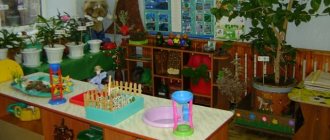My child visited a psychologist's office. What does it mean? Is there something wrong with the baby? Am I a mediocre parent and can’t cope on my own? Will they stuff him with pills and turn him into a “vegetable”? Will we be registered and then notified at school?
Unfortunately, these are exactly the thoughts that come to the minds of many parents at the mere thought of consulting a child psychologist. Because of our culture and social pressures, we often think that going to therapy is a stigma for being stupid and unlucky, when in reality it’s quite the opposite.
Children's Montessori is in a hurry to understand the question of who needs a child psychologist and why, and also to prove that visiting a psychologist is a completely safe and effective way to cope with the difficulties of parenting and improve interaction in the family.
What does a child psychologist do?
First of all, let's figure out what a child psychologist does and what he doesn't do, and also separate a child psychologist from a psychiatrist, neurologist and teacher.
Child psychologist conducting psychological diagnostics
A child psychologist is well versed in age norms and individual characteristics of child development, therefore, with the help of special diagnostic procedures (psychological tests, observations, interviews with parents, games, etc.) he can give a detailed psychological characteristics of the child, which includes a description of the level of development of thinking and memory , attention, voluntary regulation, characteristics of personal qualities, emotional state, temperament, etc.
Such diagnostics are used to understand the causes of a child’s behavioral or emotional difficulties, to help parents decide when it is better for the child to go to school or kindergarten, to try to prevent possible difficulties associated with the beginning of education, to select suitable developmental activities or to adjust parenting methods .
Child psychologist conducting consultations for parents
A specialist in the field of child and family psychology also has training in the field of educational psychology and educational psychology, so he can help parents understand how to solve the current problem in the upbringing or condition of the child (for example, he began to cry more often, bites, draws creepy monsters, does not start talking, has trouble sleeping, is too shy, etc.), and also choose the best way to help the child survive difficult events in life (moving, having a brother or sister, parental divorce).
During the consultation with parents, the psychologist provides them with informational support, talking about the age characteristics of children, possible reasons for their behavior and ways to correct it, and also supports parents emotionally, helping them understand that there is a way out of any problem.
A child psychologist conducts developmental and corrective classes for children
Of course, a child psychologist also conducts classes for the kids themselves. The goals of these classes can be very different: from developing the child’s cognitive processes to working with complex emotional experiences and childhood traumas. Usually, parents make the decision to have their child attend classes with a psychologist after conducting a psychological diagnosis of the child and an initial consultation.
Different psychologists adhere to different methods of work, some of them have several. The psychologist always discusses the nature of activities with the child and their goals with parents, so do not worry that you will not know what your child is doing with the psychologist.
A child psychologist works with healthy children and their parents, helping them overcome life's difficulties, conducting diagnostics, consultations for parents and developmental activities for children.
What doesn't a child psychologist do?
Diagnostics, consultations and correctional and developmental activities are the three main areas of a psychologist’s work. The rest directly follow from them: drawing up recommendations and conclusions, developing educational materials, conducting trainings for parents, etc. The range of tasks is wide, but there is still a clear list of things that a psychologist will never do:
- The psychologist does not make diagnoses or prescribe medications
Only a doctor (in our case, a psychiatrist or neurologist) can make any diagnosis and prescribe medications based on it; an ordinary psychologist can only work with healthy or mildly disabled children. It is worth remembering that a psychologist can recommend visiting other specialists if he suspects some kind of disorder in a child, and following these recommendations and informing the psychologist about the results will greatly increase the effectiveness of his work and the speed of achieving the goal you need.
- The psychologist does not make decisions for parents
Is it possible for a child to go to school? Should you tell your child about his grandfather's death? How to prepare children for an addition to the family? Psychologists will be happy to advise parents on these and many other issues, help analyze the pros and cons of each scenario, give their recommendations, but will never insist on any single outcome, so the final decision always remains with the parents themselves.
- The psychologist does not evaluate the actions of parents and never condemns them
Many mothers and fathers are afraid that during the consultation they may feel like schoolchildren who are being scolded by a strict teacher. In fact, the task of a psychologist is to help you cope with difficulties and find the best way for yourself to solve the problem. That is why the psychologist is always on your side.
If you feel that you are raising your child incorrectly, a child psychologist can help you understand the reasons for your thoughts and behavior and find ways to change them. If you feel insecure or afraid, a psychologist will provide you with emotional support and help you find a way out of the situation. Under any circumstances, the psychologist observes the principle of respect for the client.
- The psychologist does not disclose the information received to anyone.
Every psychologist is obliged to keep everything that happens and is discussed during the consultation secret from any strangers and even other family members. Be sure that if you shared something with a psychologist, he will not tell either the child’s teachers or your husband about it, will not write about it on Instagram for you, and, moreover, will not inform the school or kindergarten. If a child tells something important to a psychologist, he partially discloses this information only to his parents and to the extent necessary to achieve his goals.
A psychologist can give recommendations to a child’s teachers, but never reveals family secrets. So, for example, if a child has had negative experiences with peers, the psychologist may recommend that the teacher pay special attention to the child’s interaction with other children in the group, but will not tell the details of the traumatic events.
- A psychologist does not undertake to work with a client if he does not feel confident in his knowledge of a specific problem.
Child psychologists specialize in different problems and use different methods of work. This means that sometimes the psychologist is not ready to take on the client’s problem. In such cases, he usually recommends contacting colleagues who specialize in this issue. This behavior indicates a responsible approach of the specialist and a sincere desire to help his client.
A professional psychologist is a person with appropriate education and work experience who always acts for the benefit of the client, allowing children and their parents to more easily overcome age-related crises and life’s adversities.
Psychologist Marina Zhukova tells what happens in the child psychologist’s office:
Consultation for teachers:
“Psychological comfort of a child in kindergarten”
Kindergarten is a special place in the lives of most of us. This is a warm and cozy home in which each child is accepted and understood as he is, developing him in the future as an individual. One of the most important areas in the work of teachers is creating a comfortable psychological climate for children. It is very important in what mood the child will cross the threshold of kindergarten. I would like to see every child going to kindergarten happy and not burdened with worries beyond their age.
Currently, scientists in the field of pedagogy and psychology talk and write about the humanization of education, about an individual approach to children in the process of training and education, about attention to each child, about creating an atmosphere of psychological comfort in kindergarten. Psychological comfort for a child in kindergarten is determined by the convenience of a developing space and a positive emotional background, the absence of tension in the mental and physiological functions of the body. The general atmosphere and mood of the group are determined, despite the individual characteristics of the children, by the adults.
It is known that as soon as you cross the threshold of a group, you can feel the atmosphere of relaxedness or closedness, calm concentration or anxious tension, sincere fun or gloomy wariness that is present in the group.
The atmosphere in a kindergarten group is determined by:
1) The relationship between the teacher and children;
2) Relationships between the children themselves;
3) Relationships between educators;
4) The relationship between educators and parents.
A good climate in a group occurs when all its members feel free, remain themselves, but at the same time respect the right of others to be themselves. The teacher has a very significant influence on the quality of the group climate. In fact, it is the teacher (and not the children, as we usually think) who creates a certain climate in the group.
The first step that an educator interested in creating a favorable atmosphere in a group must take is to create and analyze the group situation.
We can highlight the criteria that make up the psychological comfort of a child in a preschool educational institution.
1. Calm emotional environment in the family.
Emotional stability and the absence of psychological stress in a child in the family have a great influence on psychological comfort in a preschool educational institution. Confidence in the love, respect and understanding of loved ones sets the child up for open, friendly relationships with teachers and peers in kindergarten. The teacher’s task is to study the psychological situation in the family through questioning and monitoring; as well as taking into account the individual characteristics of each family.
2. Daily routine
It is important for a preschooler to have a stable routine. A child who is accustomed to a certain order is more balanced. He imagines the sequence of classes, the change of activities during the day and tunes in to them in advance. An atmosphere of calm life, lack of haste, reasonable balance of plans of adults are necessary conditions for the normal life and development of children. During the day, neither the teacher nor the children should feel tension from the fact that they do not have time to do something and are in a hurry to get somewhere. The main components of the FGT regime are food, sleep and walking for at least 2 hours; other points may vary depending on age and program tasks.
When going to bed, children need affection, attention and care. Awakening should occur in a calm environment, without haste. It is mandatory that a teacher or assistant teacher be in the group during sleep.
Walking is the main condition for children's health. Conducting classes indoors by reducing walking time is strictly prohibited. The walk must be carried out in accordance with the requirements of FGT and maintaining all parts and activity of the teacher.
Children should have free access to clean drinking water and a toilet at all times.
3. Ensuring the comfort of the subject-development environment: compliance with the age and current characteristics of the group; availability of toys, non-irritating color scheme of the interior, presence of plants with aroma that helps relieve stress (cinnamon, vanilla, mint), etc.;
4. The teacher’s behavior style.
Staying in a group of 20–25 peers for the whole day is a big burden on the child’s nervous system. How to create a calm environment? First of all, the teacher himself must be calm and friendly. An even demeanor with children is required. The teacher needs to monitor his psychological state to prevent aggressive outbursts and apathetic fatigue. Inadmissibility of psychological pressure on children and rudeness with them. Monitor the noise level in the group: children’s voices that are too loud and harsh intonations create a negative background for any activity.
There are a few simple general rules that will help you establish good relationships with children and earn their trust and gratitude:
use endearments and names more often in your speech;
sing with and for children;
appreciate the moments when together you can experience the joy of something you saw or heard;
strive to provide children with a variety of interesting experiences;
make sure they are never bored and keep busy with something;
encourage children’s desire and attempts to do something without judging the results of their efforts;
maintain the inner conviction that every child is smart and good in his own way;
instill in children faith in their strengths, abilities and best spiritual qualities;
Find personal contact and an individual communication style with each child.
create positive traditions of group life.
A teacher’s ability to create situations of success for each child has a huge impact on the child’s emotional state and the formation of his personality. This is facilitated by the inclusion of the child in holidays and performances. Even the most insignificant role gives the child confidence in his own importance and increases self-esteem. A child’s trust in adults and personal stability are violated if the child is “left out” of a group public performance. This is the most important condition for a child’s trust in adults in kindergarten and a feeling of general psychological comfort.
5.Good traditions
A necessary condition for mental well-being is the child’s confidence that the teacher treats him as fairly and kindly as everyone else, that he is considered as valuable and necessary a member of the group as other children. In everyday life, situations constantly arise when someone is given more comments, someone is praised more often, etc. This can make children feel that they are not treated equally by the teacher. In order to convey to each child that he is valued equally with everyone else, it is advisable to introduce some traditions into the life of the group and strictly adhere to firm principles in his own behavior.
A wonderful tradition to celebrate children's birthdays. It is necessary to prepare a single scenario that will be equally reproduced when honoring each birthday person (a traditional round dance game - for example, “Loaf”; learn great songs for a boy and a girl with children).
You can introduce another custom - “Circle of Good Memories.” This is a mental return to the past day in order to note all the positive things that each child did. In the afternoon, for example, before a walk, the teacher invites all the children to sit around him to talk “about good things.” Then you need to briefly say something good about each child. Suffice it to say that Masha quickly got dressed today, Sasha immediately fell asleep, etc. The most important thing is that every child will hear something positive about themselves, and the rest will understand that everyone has some merits. This gradually creates an atmosphere of mutual respect in the group and develops self-esteem in each child.
At an older age, children have greater cognitive activity; often we simply do not have time to answer all children’s questions, brushing them off. The tradition of the “Interrogative Place” is very good: a chair with a question mark pasted on it, the child sits on this chair, indicating that a question has arisen; the teacher’s task is to pay attention to the child who is in the “question place.”
Children love to do their own thing at the common table. Together with the children, you can move the tables and invite several children to sculpt and draw. Many more children immediately join them. Everyone will sculpt, draw, build something of their own, the way they want. But everyone will have a pleasant feeling of calmly working alongside others. In addition, children can borrow ideas or ways to implement them from each other and from the teacher. These moments of calm and conflict-free communication also help create a friendly atmosphere in the group.
We must not forget about working with parents; only through joint efforts can we create a favorable psychological climate for the child. Examples could be success diaries, boxes of good deeds, success daisies on the locker at the end of the day, etc.
The atmosphere of psychological comfort for the child is created by the psychological space of a safe environment, which is at the same time developmental, psychotherapeutic, and psychocorrectional, because in this atmosphere, barriers disappear, psychological defenses are removed, and energy is spent not on anxiety or struggle, but on educational activities, on creativity.
The creation of psychological comfort is facilitated by:
- working with natural materials - clay, sand, water, paints, cereals; art therapy (treatment with art, creativity) - captivates children, distracts them from unpleasant emotions;
- music therapy - regular musical breaks, playing children's musical instruments. Mozart’s music (and Pushkin’s poems – the “golden ratio”) has a positive impact on the development of creativity and the stabilization of the emotional background;
- providing the child with the maximum possible independence and freedom at his age.
The emotional state of the teacher directly affects the emotional background of the group and the psychological comfort of each child.
Respect children! Protect them with love and truth.
Do no harm! Look for the good in children.
Notice and celebrate your child’s slightest success. Children become embittered from constant failures.
Don’t attribute success to yourself and blame the student.
If you make a mistake, apologize, but make mistakes less often. Be generous, know how to forgive.
Create a situation of success in class.
Do not shout or insult the child under any circumstances.
Praise in the presence of the team, but farewell in private.
Only by bringing a child closer to you can you influence the development of his spiritual world.
Evaluate the action, not the person.
Let your child feel that you sympathize with him, believe in him, have a good opinion of him, despite his mistake.
Before moving on to recommendations for creating psychological comfort in kindergarten groups, I would like to pay special attention to the psychological comfort of teachers. Everyone knows that children have a developed intuitive ability to grasp the emotional state of adults. It is worth emphasizing that the decisive role in creating an emotional atmosphere belongs to the teacher, his own mood, the emotionality of his behavior and, in particular, his speech, as well as his loving attitude towards children. Children very easily become infected with negative emotions, so the teacher needs to arrange a psychological shower for himself, which will help him relieve unnecessary emotional stress.
Recommendations “Creating conditions for a psychologically comfortable stay of a child in kindergarten”
To create conditions for a psychologically comfortable stay of a child in kindergarten, it is necessary:
— Accept every child as he is.
Remember: there are no bad preschoolers. There are bad teachers and parents.
— In professional activities, rely on the voluntary help of children, include them in organizational aspects of caring for the premises and area.
- Be an entertainer and participant in children's games and fun.
— In difficult situations for a child, focus on his age and individual characteristics: always be with them, and not do something instead of him.
— Involve parents in the educational process and turn to them for support in cases of non-standard situations.
- Remember: the child does not owe us anything. It is we who must help the child become more independent and responsible.
— There should not be too many prohibitions and strict requirements. This leads to passivity and low self-esteem in students.
— A quiet, shy child also needs your professional help, just like a notorious fighter.
Parents, teachers and a kindergarten teacher-psychologist must be like-minded people who understand that raising a child must be done through joint efforts. To do this, it is necessary to create optimal conditions for the psychological and emotional well-being of each child.
What is the difference between a psychologist and a teacher, neurologist and psychiatrist?
You should be well aware of the differences between a psychologist and a teacher, neurologist and psychiatrist.
A neurologist and a psychiatrist are people with higher medical education who have a specialized license for medical practice; they have the right to prescribe medications and prescribe treatment.
A neurologist deals with disorders in the functioning of the nervous system: headaches, constant fatigue, tics, back pain, head injuries, fainting, coordination and balance disorders, sleep disorders, in some cases sensory organ disorders, and more.
A psychiatrist deals with mental disorders: personality disorders (for example, attacks of uncontrolled aggression), mood disorders (depression and impaired motivation, sudden mood swings, etc.), disorders of cognitive functions (impaired perception, for example, hallucinations, thinking, memory, etc. etc.), painful personality changes after traumatic life events (sleep problems, aggressiveness, isolation, etc.). The task of doctors is timely diagnosis and assistance in eliminating or alleviating the symptoms of the disease and improving the patient’s quality of life.
A teacher is engaged in teaching and raising children. He has a pedagogical education and is responsible for the knowledge and skills of children, as well as their ability to comply with accepted standards of behavior. The teacher evaluates the child’s knowledge and skills and their compliance with age norms, studies how the child acquires new knowledge and retains the material covered in his memory. Developmental classes with a teacher allow the child to learn new things and also help improve the child’s learning ability.
A psychologist is a specialist with a psychological education, whose task is to take care of the psychological well-being of the client. It helps people fight negative thoughts and reactions, strengthen self-esteem, improve communication skills with other people, develop the cognitive sphere, overcome life crises and difficult periods, resolve family conflicts and much more. All psychologists have different additional education and areas of professional interest: some work with marital relationships, others provide career counseling, others help improve parent-child relationships and promote the harmonious development of the child, and others specialize in working with traumatic events and their consequences.
Specialists from different fields usually tend to work together: this gives better and faster results. Therefore, it is not surprising that one specialist will recommend seeking advice from another. So, for example, it is completely normal if a psychologist recommends seeing a psychiatrist or neurologist, and a teacher gives a recommendation to visit a psychologist. Remember that all specialists are solely interested in getting rid of the problem as quickly as possible, so their recommendations should be followed.
In what cases should you contact a child psychologist?
So, we found out that the psychologist works with healthy children and kids with mild developmental disabilities. A child psychologist conducts diagnostics, developmental classes and consultations for parents. In what cases should you consult a psychologist?
Abrupt changes or traumatic experiences in a child's life
Order and stability are very important to kids, so the world becomes predictable, understandable, and therefore a safe place for them. It is for this reason that sudden changes in conditions (moving, changes in family structure and lifestyle) and, even more so, traumatic events (divorce of parents, death of a loved one, physical or psychological violence experienced) can be a serious test for a child.
At such moments, a consultation with a child psychologist will help parents understand how the child copes with changes, how they can help him, and for the child himself, classes with a psychologist can become a comfortable place to experience difficult experiences.
The appearance of unwanted behavior in the baby
Changes in behavior, disobedience, tearfulness, aggression towards other children and adults, shyness, isolation, excessive fantasizing, nightmares, stubbornness, lack of curiosity, slowness, difficulties in kindergarten and school and other behavioral problems can also be a reason to consult a psychologist . He will be able to determine whether such behavior is normal, explain its reasons and help parents choose the best educational tactics to normalize the situation.
Parents' fatigue and lack of confidence in their abilities
It would be great if parenting always brought only positive emotions, and we always knew what to do in the best way. But, unfortunately, even the most attentive and responsible mother can feel lost, not know what to do next and need emotional support. In a situation where the experiences are primarily related to the child, you can contact a child psychologist. For example, if you feel guilty towards your child for devoting little time to him, if it seems to you that you do not have the strength to raise a child, you lash out at the baby, or if you do not understand how to raise a child correctly. In all these cases, a child psychologist will provide you with emotional support, help you find an inner resource, and give recommendations on how to restore strength and self-confidence.
Psychological counseling in preschool educational institutions
Psychological counseling in preschool educational institutions
Psychological counseling in kindergarten settings,
as noted by psychologist T.D. Martsinkovskaya, is “a system of communicative interaction between a psychologist and persons in need of psychological help of a recommendatory nature.” In preschool settings, psychological influence is carried out indirectly, through parents and teachers. Psychological and pedagogical counseling is aimed at the practical solution of the most important task of developmental psychology - the task of systematic monitoring of the progress of children’s mental development in order to optimize and correct it. Unlike other types of psychological counseling, the subject of psychological and pedagogical counseling is the dynamics and content of the child’s mental development at each age stage of development, that is, individual characteristics of age-related development.
The practice of psychological and pedagogical counseling is based on the theory of the child’s mental development in ontogenesis. The principles of psychological and pedagogical counseling include (O.A. Karabanova) ethical, strategic and tactical.
The most important ethical principles
are:
— principles of respecting and protecting the interests of the child and respect for his personality;
— principles of voluntariness and confidentiality of seeking advice, non-disclosure of information;
— the principle of competence and responsibility of the consultant.
Strategic principles
, defining the goals and objectives of counseling and assistance in overcoming psychological problems and developmental difficulties are:
— the principle of normative development (comparing individual development options with the age norm);
— the principle of systematic mental development, which necessitates the establishment of a system of causes of difficulties and deviations in the development of a child and the development of a comprehensive program of preventive and corrective measures.
Tactical principles
psychological counseling include:
— the principle of subtext analysis that reveals the true reasons for seeking advice;
— the principle of comprehensiveness of a child’s psychological examination, which allows us to give a complete picture of the child’s current psychological status, features of the development of the emotional, personal and cognitive spheres;
— the principle of stereoscopic diagnosis, which sets the need to study the peculiarities of understanding and experiencing problematic situations by all its participants;
— the principle of reconstructing the history of a child’s development (L.S. Vygotsky), which requires recreating the child’s individual life path;
— the principle of actively involving parents and other significant persons in the child’s environment in the joint development of a system of preventive and correctional and developmental measures and their implementation.
Psychological and pedagogical consultation takes place in several stages
, on each of which the corresponding tasks are solved:
- stage of collecting initial information (initial reception, identifying a complaint, clarifying and formulating a request, collecting anamnestic data);
- stage of comprehensive psychological examination;
- analytical stage (analysis of the data obtained, their integration, formulation of a psychological diagnosis and conditionally variable forecast; drawing up a psychological report, development of a system of psychological and pedagogical recommendations);
- the stage of actually consulting and providing psychological assistance to the client (bringing the results of the examination to the addressee, jointly developing recommendations for optimizing the child’s development, determining a plan for correctional and preventive work);
- stage of implementation of corrective and preventive measures.
In Order 2405 “On approval of the basic component of the activity of a teacher-psychologist” dated November 12, 2010, one of the priority tasks of a teacher-psychologist at a preschool educational institution is to identify and overcome deviations and problems of a preschooler. Currently, the following difficulties characteristic of preschool educational institutions are identified:
1. Deterioration of children's health:
- changes in the physical and mental state of children, which have a negative impact on the process of education and development of the child’s personality.
2. Children's unpreparedness to enter kindergarten.
3. Difficult adaptation of children to the conditions of kindergarten.
4. Failure of parents to support the child.
— incompetence of parents in matters of psychological and pedagogical development of children;
- weakening of spiritual ties between parents and children, crisis state of family relationships;
- exclusion of children from the family, leading to “social orphanhood” and an increase in vagrancy.
5. Insufficiency of scientific, methodological and technological materials providing support process:
- the absence today of a generally accepted theory of psychological and pedagogical support for a child in practical activities;
— insufficient methodological and didactic support for psychological and pedagogical support;
— pedagogical technologies implemented in preschool educational institutions are focused on the collective education of children, without taking into account their individual characteristics;
— complicating educational programs without taking into account the capabilities of children.
6. Low qualifications of teaching staff:
— insufficient number of highly qualified specialists who could effectively provide the necessary assistance to children and their parents in full;
7. Maintaining an authoritarian style in relationships with a child.
Cases of complications in the mental development of a child of senior preschool age lead to the emergence of many psychological problems and negatively affect his social and psychological adaptation. Various deviations in the psychological health of children have been the subject of research by many domestic and foreign psychologists, and therefore, today, there is a generally accepted classification of psychological problems that arise in children (Wenger A.L. 2001).
Highlight:
- Problems associated with mental development (underachievement, poor memory, impaired attention, difficulties in understanding educational material, etc.);
- Behavioral problems (uncontrollability, rudeness, deceit, aggressiveness, etc.);
- Emotional and personal problems (low mood, increased excitability, frequent mood swings, fears, irritability, anxiety, etc.);
- Communication problems (isolation, inadequate claims to leadership, increased sensitivity, etc.)
- Neurological problems (tics, increased fatigue, sleep disturbances, headaches, etc.) Alekseeva E.E. considers thumb sucking, object sucking, nail biting, masturbation as pathological habits of children, and puts them on a par.
The purpose of psychological counseling
is to optimize the interaction of participants in the educational process and provide them with psychological assistance in building and implementing an individual education and development program. Psychological counseling consists of providing psychological assistance in solving problems that parents, educators and preschool administration address.
Consulting presupposes the active position of the counselee, joint elaboration of existing difficulties and the search for optimal solutions.
The topics of the consultations should not go beyond the professional competence of the teacher-psychologist of the preschool educational institution.
Necessarily:
— Consulting on issues related to optimizing the educational process in preschool educational institutions and families in the interests of the child.
-The psychologist must conduct group and individual consultations with teachers and parents (1 group consultation for parents and 1 for teachers per month)
— A psychologist can initiate other forms of work with the staff of an institution for the purpose of personal and professional growth.
Psychological education and training.
Target:
creating conditions for increasing the psychological competence of teachers, preschool administration and parents, namely:
— updating and systematization of existing knowledge;
— increasing the level of psychological knowledge;
— inclusion of existing knowledge into the structure of activities.
Psychological education should not be limited to general information on child psychology. It is necessary to rely on the results of studying the specific features of a given preschool educational institution, take into account traditions and local conditions, the qualifications and characteristics of the teaching staff, the uniqueness of children and parents.
Necessarily:
— Conducting systematic psychological education of teachers (possible topics - see “sample list”).
— Conducting systematic psychological education of parents in the form of parent-teacher meetings, round tables, etc., with mandatory consideration of the relevance of the topics under consideration for parents in the topics of the children’s age. (see list of topics)
The source of additional counseling is the creation of information corners, stands, and folders of movements similar to “Advice from a Psychologist”
Each of these areas should be built taking into account the age capabilities of children, the leading type of activity and, if possible, rely on gaming technologies and techniques.
An approximate list of topics for psychological education of teachers:
- Psychophysiological characteristics of children of each adult group.
- Patterns of development of children's collectives.
- Features of a teacher’s work with problem children.
- Styles of pedagogical communication.
- Psychological foundations of working with families.
parents:
- Adaptation of a child to a preschool educational institution.
- Crises of 3 years and 6-7 years.
- The most common mistakes in family education.
- Prevention of unfavorable development of a child’s personality: infantilism, demonstrativeness, verbalism, withdrawal from activities, etc.
- Education of arbitrariness of behavior and controllability. Psychological readiness for learning.6. Sex education and development.
conclusions
A child psychologist is a specialist who helps children and their parents harmonize relationships, overcome life’s difficulties and adversities, and normalize the child’s behavior and emotional state. A psychologist works only with healthy children and their families, so we are never talking about making diagnoses or prescribing medications, only psychiatrists and neurologists do this.
Difficulties happen in the life of any family, and sessions with a psychologist allow you to overcome them faster and more effectively. The principles of providing psychological assistance make such activities safe: specialists always monitor the confidentiality of data, use only proven work methods, are always on the client’s side and never work outside their area of competence. In addition, the psychologist never insists on the only correct decision and, moreover, does not condemn family members.







